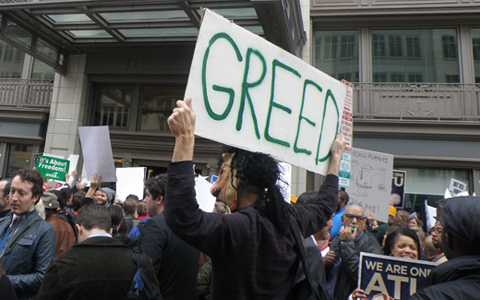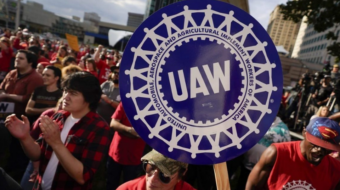
If you want or need any more evidence that U.S. corporate executives and financial finaglers are really nothing more than crooks in costly suits, all you needed to was right on the front page of the July 3 New York Times.
One story got national play; the other got financial notice. But both re-emphasize the vein of venality and viciousness that runs through modern U.S. capitalism.
The story with national play was GlaxoSmithKline (GSK), the big drug maker, pleading guilty to criminal charges for improperly and illegally promoting its best-selling anti-depressant drug and for failing to report safety problems with a leading diabetes drug. It agreed to stop the illegal promotions and to pay a $3 billion fine.
This is the company, by the way, that battled all the way to the U.S. Supreme Court – and won two weeks before – in fighting to declare its pharmaceutical sales reps ineligible for overtime pay under the Fair Labor Standards Act.
GSK’s fraud wasn’t the first drug company crime the feds found this year, the Times said. GSK’s fine followed similar sums against Abbott Laboratories ($1.6 billion) and Johnson & Johnson ($2 billion), again for shady marketing of drugs to consumers.
The other story, headlined “Conflict seen in Sales Tactic at JP Morgan” told of how the big banking house pushed its own mutual funds on retail customers – that’s you and me and our pensions and 401(k) accounts – even when other funds in Morgan’s portfolio, but not created by Morgan itself, provided better returns.
“The benefit to Morgan is clear. The more money investors plow into the bank’s funds, the more fees it collects for managing them,” the Times said. “Over the last three years, 42% of its funds failed to beat the average performance of funds that make similar investments, according to Morningstar, a fund researcher” analyzing the data.
In other words, this was a classic case of JPMorgan self-dealing at the expense of its customers. JPMorgan’s flack denied the charge, saying the financial firm always puts its customers first. And the Times reported that Morgan’s CEO, Jamie Dimon, balked at the practice, but lost in a “compromise” that let the shady trading occur.
What’s the link between the GlaxoSmithKline fraud and the JPMorgan self-dealing? There are two: One is that such shenanigans, as we’ve seen ever since the decades of greed began in 1980, are common in the corporate world. The other is that the victims are not the corporations or their officers – a $3 billion fine notwithstanding – but again, you and me.
It’s consumers who were hoodwinked into buying GSK drugs for their kids. It’s consumers who got hurt, winding up with less money for their retirement, when JPMorgan played fast and loose with investing consumers’ cash in its own, lower-paying mutual funds.
These stories, and a long line of similar financial frauds, finagling and outright crime stretching all the way back to the days of the robber barons, and in industries as varied as drugs, banks and consumer products, once again shows there is something basically wrong with the capitalist system. It’s a “system” that robs the middle class, rewards the rich and lets corporate crooks get away with financial murder.
There are ways to combat such corporate criminality. Exposure is one. The Times shows that. Disclosure – true disclosure – is another. Abolition of the heavy corporate hand on the U.S. political scales would be a third.
And, frankly, smashing of the corporate class would help. As former New York Attorney General Eliot Spitzer told the Times in the GSK case: “Money doesn’t deter corporate malfeasance. What will work is CEOs being forced to resign and individual culpability being enforced.” We would add to that: “by CEOs being sent to jail.”
If the capitalist system is this rotten, and its record since the Civil War makes a good case that it is, we seriously need to consider trashing it and replacing it with a new system that is pro-worker, pro-investor, pro-consumer and anti-corporate chieftain.
But we would also submit that there is one unrivalled check on corporate crooks, one institution that can demand – and get – the financials from the financiers and blow the whistle if and when it must. It’s called the union.
When unions sit down with firms to bargain contracts, they have the right to demand financial details. When unions use the money power of their investments to challenge corporate chieftains’ coziness with pols and shady practices, they have the capital clout to demand answers. And when unions stick up for workers, they enforce a discipline -called the rule of law – on the titans that no other institution can match.
Just another reason to organize unions in your workplace, to join unions in your workplace if they’re already there, and to get active in those unions once you do. It’s called accountability against the corporate crooks.
Photo: Public Citizen CC BY-NC-SA 2.0










